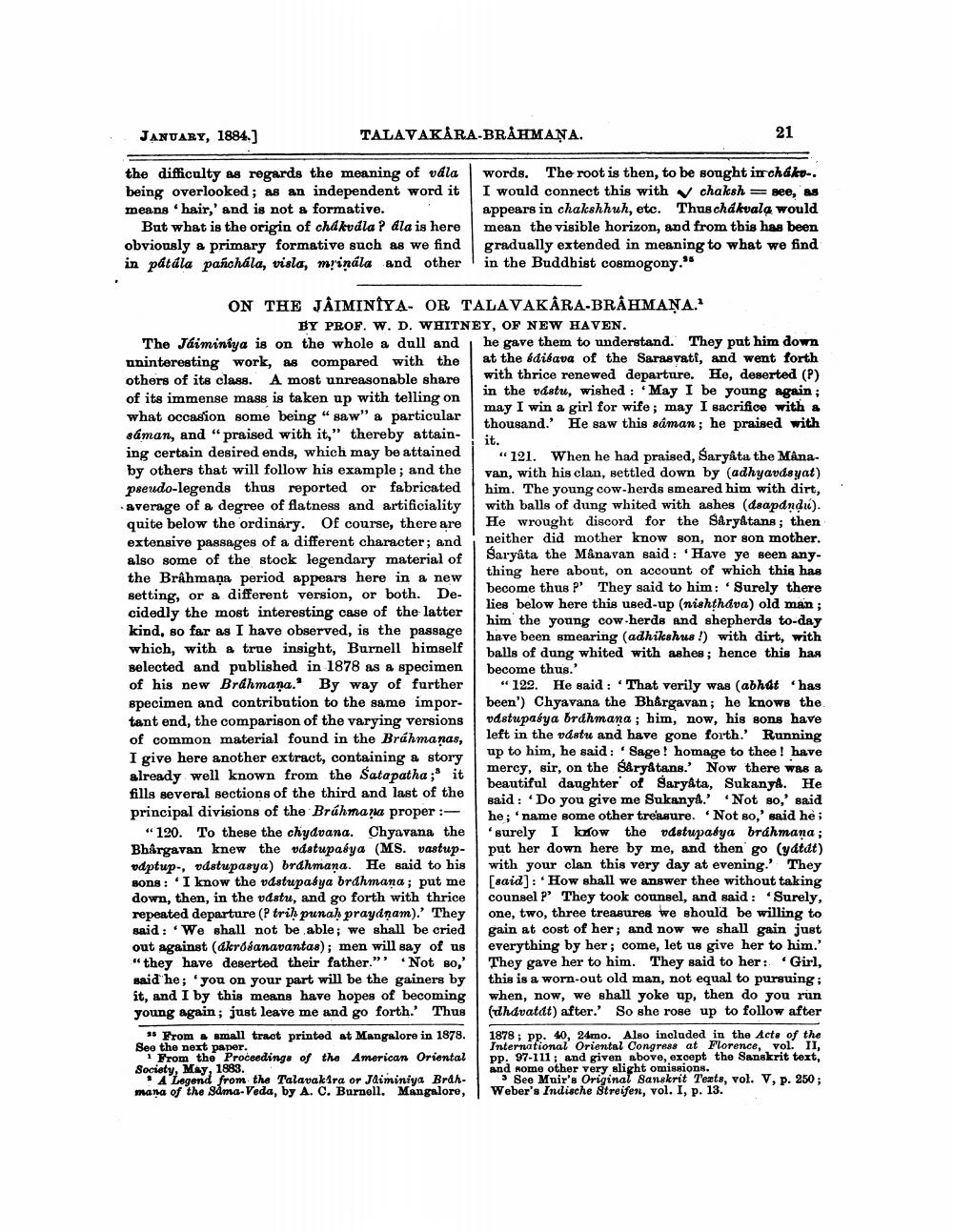________________
JANUARY, 1884.)
TALAVAKÅRA-BRAHMANA.
21
the difficulty as regards the meaning of vdla being overlooked; as an independent word it means "hair,' and is not a formative.
But what is the origin of chákvdla ? dla is here obviously a primary formative such as we find in patála pañchála, visla, mrinála and other
words. The root is then, to be sought irr chaku-. I would connect this with chaksh = gee, as appears in chakshhuh, etc. Thus chákvalą would mean the visible horizon, and from this has been gradually extended in meaning to what we find in the Buddhist cosmogony."
ON THE JAIMINİYA- OR TALAVAKARA-BRAHMAŅA.
BY PROF. W. D. WHITNEY, OF NEW HAVEN The Jaiminiya is on the whole a dull and he gave them to understand. They put him down
teresting work. compared with the at the editava of the Sarasvati, and went forth others of its class. A most unreasonable share
with thrice renewed departure. He, deserted (P) of its immense mass is taken up with telling on
in the vastu, wished : May I be young again;
may I win a girl for wife; may I sacrifice with a what occasion some being “saw” a particular
thousand.' He saw this saman; he praised with saman, and praised with it," thereby attain
it. ing certain desired ends, which may be attained
"121. When he had praised, Saryata the Manaby others that will follow his example; and the
van, with his clan, settled down by (adhyavdayat) pseudo-legends thus reported or fabricated
him. The young cow-herds smeared him with dirt, average of a degree of flatness and artificiality with balls of dung whited with ashes (dsapdndı). quite below the ordinary. Of course, there are He wrought discord for the Saryatans; then extensive passages of a different character; and
neither did mother know son, nor son mother. also some of the stock legendary material of
Saryâta the Mânavan said: 'Have ye seen any. the Brahmaņa period appears here in a new
thing here about, on account of which this has setting, or a different version, or both. De
become thus P' They said to him: Surely there cidedly the most interesting case of the latter
lies below here this used-up (nishthava) old man;
him the young cow.herds and shepherds to-day kind, so far as I have observed, is the passage
have been smearing (adhikshus !) with dirt, with which, with a true insight, Burnell himself
balls of dung whited with ashes; hence this has selected and published in 1878 as a specimen become thus.' of his new Brahmana." By way of further "122. He said: “That verily was (abhat has specimen and contribution to the same impor- been') Chyavana the Bhargavan; he knows the tant end, the comparison of the varying versions vdstupaśya brahmana; him, now, his sons have of common material found in the Brahmanas,
left in the vdatu and have gone forth.' Running I give here another extract, containing a story
up to him, he said: Sage! homage to thee! have already well known from the Satapatha ;' it
mercy, sir, on the Garyåtans. Now there was a
beautiful daughter of Saryâta, Sukanya. He fills several sections of the third and last of the
said : Do you give me Sukanya. "Not so,' said principal divisions of the Bráhmana proper :
he; 'name some other treasure. Not so,' said he : "120. To these the chydvana. Chyavana the surely I know the odstupasya brahmana; Bhargavan knew the vdatupaéya (MS. vastup- put her down here by me, and then go (yatat) odptup-, odstupasya) brahmana. He said to his with your clan this very day at evening. They Bons: 'I know the vdstupaśya brahmana; put me [said]: How shall we answer thee without taking down, then, in the vdstu, and go forth with thrice counsel P They took counsel, and said: "Surely, repeated departure (P trih punah praydnam).' They one, two, three treasures we should be willing to said : We shall not be able; we shall be cried gain at cost of her; and now we shall gain just out against (akrobanavantas); men will say of us everything by her; come, let us give her to him.' "they have deserted their father." "Not so,' They gave her to him. They said to her: Girl, said he; 'you on your part will be the gainers by this is a worn-out old man, not equal to pursuing: it, and I by this means have hopes of becoming when, now, we shall yoke up, then do you run young again; just leave me and go forth. Thus (dhdvatat) after.' So she rose up to follow after
* From small tract printed at Mangalore in 1878. 1878 ; pp. 40, 24mo. Also included in the Acts of the See the next paper.
International Oriental Congress at Florence, vol. II, From the Proceedings of the American Oriental pp. 97-111; and given above, except the Sanskrit text, Society, May, 1883.
and some other very slight omissions. ? A Legend from the Talavakara or Jaiminiya Brah- _ See Muir's Original Sanskrit Texts, vol. V, P. 250 ; mana of the Sama Veda, by A. C. Burnell. Mangalore, Weber's Indische Streifen, vol. I, p. 13.




